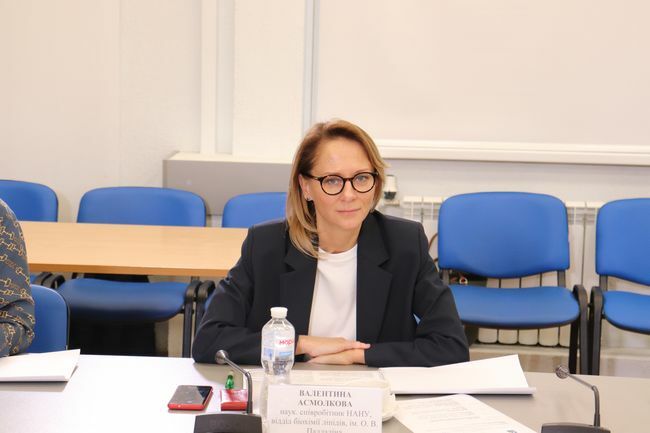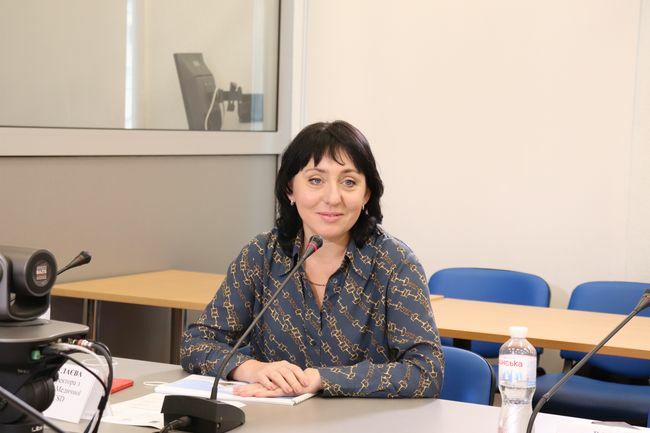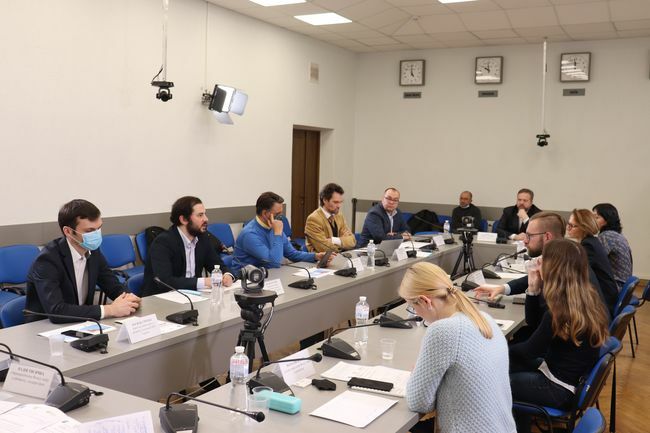"SOCIETIES WITH MORE QUALITY KNOWLEDGE WILL SURVIVE"
By the way, some countries, such as Great Britain, lay the development of a network of innovation hubs into their national defense strategy.

“In this world, those societies that have more high-quality knowledge, better technologies, high-quality natural and social-humanitarian education, greater public trust in the holders of knowledge and competencies will survive. The worse the science, the less we know about ourselves, our society, the world and nature. That is why we lose to those who have better science. High-quality education in Ukraine should become the main priority, science should be the highest form of production, and intellectual work should have the highest value, ”says the appeal “Prevent the Collapse of Ukrainian Science” by the authoritative December First Initiative Group in March this year. The Peace and Development Foundation is guided by the values of this initiative group, and in the future it plans to create a Council of Virtue, which would include moral authorities, professionals whose life and work are examples of serving society.
For your attention - the most important, "extracts" from the presentation of the study "Sphere of biotechnology in the world and Ukraine."
Natalia VITIUK, Chairman of the Board of the Peace and Development Foundation , noted: “We signed a Memorandum of Cooperation with the Ministry of Health of Ukraine, the purpose of which is to introduce measures to promote the development of the biotechnology sector.”
The countries of the world are already actively involved in the development of biotechnology. Among the advanced ones: Great Britain, Germany, Poland, India... And those that do not have their own effective research infrastructure are doomed to become suppliers of raw materials and cheap labor. They will receive medicines on a residual basis, which, by the way, was demonstrated by the situation with vaccines.
Therefore, the Peace and Development Foundation ordered the Center for Economic Strategy to research biotechnologies in Ukraine. It analyzes the key components of the ecosystem necessary for the dynamic development of the sphere. The results are used to prepare the National Strategy for the Development of the Biotechnology Industry. Actually, more about this - Deputy Director and Senior Economist of the Center for Economic Strategy Maria Repko and Iurii Haidai.
Maria Repko, Deputy Director of the Center for Economic Strategy, noted that, in fact, the experience of countries that have achieved success in the development of biotechnology indicates the following key success factors:
• access to high quality specialists;
• access to long-term financing;
• government support, including the development of infrastructure, clusters of laboratories, tax incentives for investment in research, development and implementation of long-term development strategies.
Ukraine's advantages include a base for developing human capital and attracting talent, proximity to EU countries, a large population and a diverse gene pool, which facilitates clinical research.
In Ukraine, there are centers of world-class biochemistry. We are in 46th place (out of 156 countries) in terms of the number of publications in Scopus in biochemistry, which is 161 times less than the US leader, but more than in a number of neighboring countries.
However, in terms of GDP to finance all research, Ukraine loses to all EU countries without exception. A decade ago, Ukraine and Poland had similar R&D spending shares (0.72-0.75%), but Poland almost doubled the funding share, while Ukraine almost halved it (to 0.43% of GDP). The leader in the EU, Sweden, spent 3.4% of GDP on research and development in 2019.
As an illustration of why some states manage to meet the challenges of the time, while others do not, the Peace and Development Foundation got acquainted with the study of Viktor Conde, a researcher at the UN Economic Commission for Africa. In particular, according to him, the biotech industries have been successful in those countries where, first of all, there was state support.
To find out what is the situation with this in Ukraine, the Center for Economic Strategy conducted in-depth interviews with 15 leading experts in the field of biotechnology in Ukraine, including scientists and business representatives.
“Three most significant barriers to the development of the biotechnology industry were named: industry regulatory field, access to export markets (regulatory obstacles and lack of distribution channels) and difficulties in finding talent,” said Yuri Gaidai, senior economist at the Center for Economic Strategy. “In particular, among the regulatory barriers, the most serious are over-regulation of imports and technical obstacles at customs, an inefficient licensing system and excessive bureaucracy in general.”
Therefore, representatives of the biotechnology sector expect from the authorities in the coming years actions aimed primarily at the development of human capital, dialogue with the industry to implement ethical standards and simplify regulation. As well as tax incentives for companies involved in the development and research of new technologies.
“SYSTEM WORK OF STATES WITH PRIVATE BUSINESS AND SCIENTIFIC AND EDUCATIONAL INSTITUTIONS IS NEEDED”
“The field of biotechnology is global. Let's be frank: its problems cannot be moved by the efforts of the Directorate of High-Tech Assistance and Innovations or even the entire Ministry of Health of Ukraine,” began Vasyl STRILKA, Director of the Directorate of High-Tech Assistance and Innovations of the Ministry of Health of Ukraine, who, by the way, together with his team and like-minded people, managed to move two years ago transplantation, as they say, from a dead center.

“We need systematic work of state institutions with private business, scientific and educational institutions. You also need to create a public request. That is, every citizen of Ukraine should feel the need for the development of biotechnologies, because he will see this as an advantage both for himself and for the country as a whole, he continues. - As for the implementation, simply adopting someone else's experience will not work, because we are in different conditions. For example, Britain has declared its desire to become the best hub for R&D (Research and Development - research and development - N.T.) for biotech and is already halfway there. And we are approximately at the bottom of the Mariana Trench. However, this does not mean that they should not move. This just indicates that we must move faster than others. If we talk about where to start, then, first of all, in the opinion of our ministry, it is important to identify those narrow issues that can be resolved at the first stage without investing significant resources, given the economic situation in the country. Removing legislative and regulatory barriers is a very important first step that will give impetus to the development of the sphere. And this is what we already have in our power.”
Actually, this study, emphasizes Vasily Strelko, for which the Ministry of Health is grateful to the Peace and Development Foundation and the Center for Economic Strategy, provides a basic guideline for moving forward. The draft government action plan for the next year includes the development of strategies for the development of biotech. State policy in this area is very important.
Arman KACHARIAN, state expert of the Ministry of Health of the High-Tech Assistance and Innovation Directorate, believes that the Peace and Development Foundation has actually become a mediator for interaction between the government agency, representatives of the professional community, business, and the public sector. And this has already brought the first result - our own mentioned research.
And one of the recommendations of the study: writing a long-term - for a decade - strategy. And this gives advantages - a Fund, directions for movement ... Therefore, according to him, no matter what changes take place in the ministry, it will be much easier to use information and direct resources. In addition, he says, it should be borne in mind that obtaining results in the field of biotechnology is a “long game”.
“It sounded that the share of CIT R&D in Ukraine is low. Drawing parallels with the reform to transform the economic healthcare system, I can say that even if this percentage is low, that is, there are few funds, it is important how to invest them in a quality manner, adds Arman Kacharyan. - Just "into the walls" is ineffective. Populist calls are often heard, saying that the development of any sphere means an increase in funding. Funding is good, of course. The question is how to finance. Thus, research work in the Ministry of Health is funded on a competitive, grant basis, that is, not the institution itself, but research, its importance, relevance. So, when we develop a strategy for the development of the biotechnology sector, we will invite stakeholders and do our best to make it as effective as possible. Taking the study as a basis, we will take into account the mistakes and shortcomings of other countries, deliberately bypassing them. Poland, for example, did so. First you need to identify weaknesses, limiting factors and fix them as quickly and efficiently as possible. There is a lot of work ahead. We will see each other in this and a wider circle.
“If the acquisition of science is applied in practice areas, then everything will work”
Viktor Dosenko, professor, pathophysiologist, geneticist, researcher at the Institute of Physiology named after A. Bogomolets of the National Academy of Sciences of Ukraine is also convinced that the study of the Center for Economic Strategy is a high-quality, promising work. Work on which not only the leadership of the Ministry of Health, but also the Cabinet of Ministers or the Office of the President should draw the right conclusions.

Oksana SULAEVA, Medical Director of CSD Medical Laboratory, agrees with her colleagues about the thoughts and suggestions that were voiced during the presentation. Especially, she believes, attention should be paid to the content of the curricula: “It should be integrated interdisciplinary and international programs. As experience shows, as soon as they cooperate with foreign partners, the quality of education and research immediately increases. The same applies to cooperation with business. We also note that research culture as such is poorly developed in Ukraine: there are many cases of impiety, “mastered” grant research, the results of which have never been presented in serious international peer-reviewed publications… often purely formal.

Therefore, according to her, through the formation of independent ethics commissions, the dissemination of knowledge on research ethics and the formation of a normal regulatory framework, it will be possible to achieve at least the minimum that should be for the formation of a normal scientific environment and research culture.
The question may arise: what about this topic the Church has to do? However, we are talking not only about the UGCC, but also about a certain position of the religious community of Ukraine,” said Reverend Andrii NAHIRNIAK, Deputy Chairman of the Social Service Department of the UGCC. For the Church, first of all, is people and values.
“There is an opinion that scientific research is morally neutral, and their implementation is good or bad. But science is also a moral issue. Therefore, here we are talking about questions of values, first of all, because there is no conflict between faith and science. The Church says that faith and science are the two wings that can lift a person up. For example, I am a physicist by my first education, - Reverend Andrii Nahorniak noted. – Obviously, we understand that biotechnologies cause distrust among many, even fear, opposition – we see this in the example of the situation with vaccination. Therefore, a dialogue is needed. Churches have a positive experience of cooperation with the Ministry of Health, in particular, in transplantation, where our position is restrainedly positive - in the sense that only then the decision is good when it is made personally.”
Reverend Andrii Nahirniak drew attention to the fact that the UGCC showed courage and took responsibility on the issue of vaccination, because there are different views among believers. The Church is ready to continue to be involved in ongoing processes and communicate with people, as this helps to create synergy in order to achieve the common good.
"A PATH OF A THOUSAND STEPS BEGINS FROM THE FIRST". DISCUSSION
Ivan MYKHALCHUK, co-founder of the NGO "Ukrainian Association of Research Biobanks", supports the voiced position of the Ministry of Health - there is no resource to influence everything. Therefore, according to him, we need to see targeted goals that we can achieve.
“One of those goals is to create an ecosystem. The ecosystem is based on the general rules of the game. The study noted that the biggest problem of biobanking activity is regulation. How does it connect with the ecosystem? If a foreign investor wants to come here, he identifies systemic risks, which include regulation. To be honest, sometimes they no longer pay attention to it, linking it with the peculiarities of doing this business in Ukraine. But we have a request to create a healthy ecosystem and change the regulation. Because without the development of biobanking, the development of biotechnologies will be inferior and will have a certain ceiling. And in the very field of biobanking, I won’t say that there is a gap, but a blue ocean, to put it in economic terminology. In other words, there is where to set the rules of the game and where to move. This, in fact, is also in the study.
Ivan Mikhalchuk also recalled that in an August interview with Ukrinform, initiated by the Peace and Development Foundation , Minister Viktor Liashko drew attention to the fact that “in the modern world, those countries that do not have sites for their own production of diagnostics, medical devices and medicines are especially vulnerable. because a pandemic or emergency creates a global shortage.”
It is good that we are aware of the technological gap between us and developed countries, Andrii GOI, Technical Director of Farmak PJSC, drew attention. However, in order to approach the current level of development of biotechnology in ten years, he notes, thousands of specialists and tens of billions of dollars of investment are needed. Not necessarily state, maybe venture capital.
“For example, the study shows the dynamics of Poland. So, this dynamics with the support of the European Union was worth the mentioned figures! For 20 years, Farmak has invested about half a billion dollars in new production facilities, laboratories, and the creation of technologies... Despite this scale, we remain a pharmaceutical company, modern, European, but with a small share of biotechnological products. If we go into the biotechnological direction systematically, then we understand well the price of such innovations, which can pay off only when our own biotechnological developments are brought to the world markets, - Andrii Goi adds. – And now in the world, it is technology that is becoming the main factor in global competitiveness. In order to attract high technology, states compete with conditions that create “brains” and an investment climate. It is the favorable investment climate that stimulates strategic investment in the country, in particular, the placement of technologies in its space.”
Andrii Goi believes that the choice of priority technological platforms is important first of all. Now everyone is fascinated by the examples of BioNTech, which collaborated with Phizer to create a vaccine against COVID-19, or the same company Moderna, the manufacturer of the vaccine of the same name, which developed them in a year. But such success is built on the shoulders of decades of effort and investment in the chosen technology platform.
“We have gathered to identify such promising platforms. The journey of a thousand steps begins with the first. The next step is the development of a roadmap for the development of the domestic biotechnology industry. And Farmak is ready to be an active participant in the process of creating an innovative ecosystem of domestic biomedical technology,” he stressed.
The contribution of SCIENCE TO EUROPEAN UKRAINE. KEY CONCLUSION
And as a result - a quote from the above-mentioned appeal "Prevent the Collapse of Ukrainian Science" by the December 1 Initiative Group: "... Both the authorities and all of us must remember: without modern high-quality universities and without a powerful scientific system, democratic European Ukraine with secure borders and a high standard of living citizens is impossible.
To confirm this, in 2022 the Peace and Development Foundation plans to hold a Biotechnology Day. We invite all interested and caring people to join and submit their proposals to the email: info@pdf.org.ua
Nadia TYSIACHNA, photo by Mikhail Bozhko
